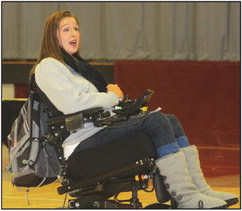Students told: There is power in hope


“Some people actually tell me they feel sorry for me,” began Tasha Schuh as she sat in her wheelchair facing a crowd of Loyal, Greenwood and Granton high schoolers on Jan. 27. ...


“Some people actually tell me they feel sorry for me,” began Tasha Schuh as she sat in her wheelchair facing a crowd of Loyal, Greenwood and Granton high schoolers on Jan. 27. ...